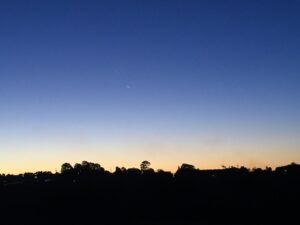Seeing, Being…

Like Alice’s bluebell, though not surprised into view, Sophia’s soul is visible in this photograph. Seeing and being…
Sophia thought a great deal about being. In Rough Sleepers, her last collection, the nature of human consciousness—what it is to be a thinking, sensate yet spiritual being—is a central theme.
One of the poems from a longer sequence, A Hot Summer, written in response to the death of her father (a year after his death and a year before her own), is concerned with the concept of consciousness. It begins, as in Alice’s Cyanometer, with the experience of colour—for, Sophia says, it is bees who feel the seduction of the ripe buds of the jacaranda trees, living as they do not in abstraction (mathematics, for example), but in total engagement. The poem ends with the thought-provoking observation that it is not the future whose unknowability we should mourn, but the blankness before birth. . .that absence before consciousness, before we knew ourselves, or the world.
A Hot Summer: VII
Colours are mathematical
But it is bees who feel the seduction of the ripe buds
Before they fall
A purple rain striking our faces like imagined snow
Like a nuclear carpet for lovers
Colours strike the eyes like pins
And we squint in fear of the white sun
Genuflecting to my burnt and spotted skin in a number of years
And I think that we ought to mourn the years before we were born
More than the unwritten future
Blank and colourless
Like a marriage of lights
It is a gift to be alive–to be a conscious being—it is a gift, the fragility and fleetingness of which Sophia knew too well. She did not waste a moment of it. In conversation always with the world around her—in full conscious awareness of it—she was equally in conversation with the collective wisdom she found in human history and thought. One of my favourite poems from Rough Sleepers, a little poem with a large theme, provides a snapshot of Sophia in just such a conversation.
Seeing—and not seeing—lies at the heart of it.
Dedicated to a dear friend (on whose doctoral thesis about the poetry of Wallace Stevens Sophia provided editorial comment in the months before she died), its title alludes to Stevens’ fine poem The Snowman. Stevens is himself in dialogue with John Keats (who was another of Sophia’s interlocutors in Rough Sleepers, by the way). Often interpreted as reflecting a rejection of the Romantics’ use of nature to symbolise inner experience, it seems to me that Stevens is actually referencing (and agreeing with) Keats’ concept of Negative Capability, of the artist’s ability to see and represent the complexity of the world beyond the limits of the self. One must be the Snowman in order to see, to truly see, the wintry world. Like Sophia’s bees or Alice’s bluebell-struck voyagers, one must engage in the deepest of encounters to get closer to what is.
You Must Have a Mind of Twilight (for Gershon Maller, on his studying Wallace Stevens)
Every day the twilight and its chill is quicker
Blue spreads like a blush from the earth
And the seeds of the stars glisten in their beds
We long for the old cosmology of logic
The sun still falls but we deny it
We insist on a complex geometry that only schoolmistresses seem fully to
understand
We do not see the shadows metamorphose themselves
And the ripples run over the sky like currents in the sea
For we know numbers now and have forgotten all else
We do not see because, as Stevens implies in Snowman, we impose upon the world the categories of our own minds. For Sophia, there is an added dimension, a spiritual dimension, in that we moderns are bound by a materialist mindset which limits both perception and understanding.
The mystery and beauty of the universe are therefore made invisible to us.
We do not, we will not, see….

You Must Have a Mind of Twilight
